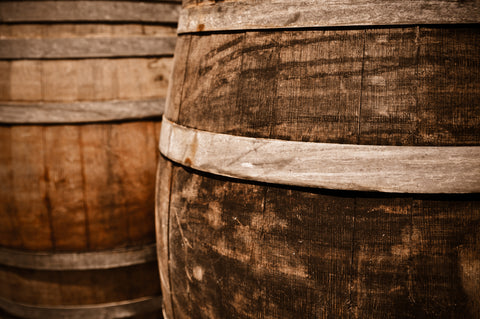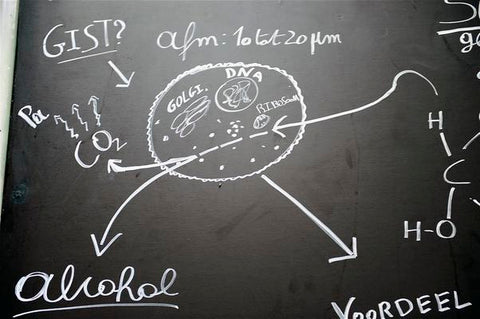- No products in the cart.
Microbreweries in Belgium

Slowly but surely, craft brewers are conquering the world. There are now several thousands of microbreweries in the USA alone. However, for some of these the term ‘micro’ can be taken with a pinch of salt: over there, big is often considered more beautiful.
The trend towards microbrewing has also started to invade some of Belgium’s European neighbours: the United Kingdom, Germany, the Netherlands, France, Spain, Italy, Scandinavia...
This micro-invasion has also landed on the shores of the country with one of the world’s greatest beer cultures. Belgian microbrewers, though, have adopted subtle ways of working.
They haven’t just jumped on bandwagons in the quest for the bitterest or sourest taste - they have far too much respect for Belgium’s rich tapestry of local beer traditions for that.
This is all well and good, but just what does it mean to be a Belgian microbrewery? Brassigaume is a beer festival that is held every October in Marbehan near Aarlen (Arlon). Only microbreweries that produce fewer than a benchmark figure of 400,000 litres-per-year are invited to take part. In some countries, production of that size would earn the title “picobrewery” or “nanobrewery”. But then again, most Belgian microbrewers aren’t really aiming for world domination.
Some see brewing as their main business but like to keep it on a small scale; others view it as a side-line or as a hobby just for fun.
There are several motivations for these microbrewers. Some people simply just want to produce the beer they really love, sometimes brewing it with friends.
The microbrewery world is a multi-coloured tapestry. Quite a few small players develop their beers at home. Once they are happy with the recipe, they outsource production to a larger brewer. At some tiny brewing outfits, the customer comes around to pick up the beer in person, as you can’t buy it in-store.
Once upon a Time...
_801x1200.jpg?1360415271)
The first microbreweries in Belgium happily surfed with the tide of specialty beers. Their revival started in the 1980s, perhaps as a reaction to many years of consolidation and industrialisation in the brewing sector. Brasserie d’Achouffe (1982) started off as a microbrewery but outgrew this status many years ago. De Dolle Brouwers (1980), however, has remained a microbrewer.
The race leaders are followed by a peloton of all shapes and sizes, from challengers to stragglers. But since the Belgian microbreweries first entered the scene, the beer world has become more and more professional. Quality inspections have become ever more stringent and consumers ever more demanding. Nowadays there is no future for ‘dabblers’.
Taste is always subject to individual opinion, but nowadays consumers demand a tasty beer that can be poured or served correctly and with a taste that fits into the beer style that they have been led to expect.
Alternatively, the modern consumer is after something completely different and intriguing - a brew that, provided he can track it down, can be discussed with friends and family over a pint - and of which he would happily order seconds.
Every self-respecting brewer, large or small, must meet the Olympic standard of consistency. Large breweries now have all the facilities to ensure this uniform quality. This is why microbrewers like to knock on their big brothers’ doors to ask for lab analyses and technical support.
A Single Batch?

Some beers are only produced in a single batch. Once stocks are exhausted, that beer will disappear from the market. The next brew – it might be quite similar, it might be completely different - will be blessed with a different name. And thus, it isn’t long before the number of beer names reaches astronomical heights.
An established brewer will then smirk: “I told you so, they can’t brew the same beer twice!” Luckily, experienced beer aficionados view this as just a minor problem.
They’re always eager to discover a new brew and will be happy to give the successful beers a try as well as those that leave something to be desired.
Also, microbrewers are very likely to go for more extreme brews. They are only producing small volumes, so compared to a large brewery they run fewer, smaller financial risks. The microbrewer is also the decision maker and doesn’t have to jump through all the hoops that await the big boys.
The bigger players have also come to realise this. This is one of the reasons why Palm Belgian Craft Brewers have recently opened their own microbrewery, named De Hoorn, on the same site as their main brewery. Here, they can develop beers to their heart’s content in co-operation with friendly sommeliers and chefs whom they know well.
All the facilities for experimentation are here, and if a new beer does hit the mark, it can always be developed further and produced on a large(r) scale.
Organic Growth

Belgian microbreweries are now reaping the benefits of the success of Belgian beer abroad. Until a few years ago, they found it hard to find a market for their products even in their own country. Many cafés are owned by large brewers, who also control a major part of distribution.
Consequently the microbreweries had to market their products domestically by finding specialty beer cafés that were not tied to a particular brewery or going to specialised retailers.
This has now taken a turn for the better. Exports are booming, thanks in part to internet selling, and some of the microbreweries and their beers have grown into little cultural phenomena.
This is often the result of a marketing strategy focusing on a niche market. Occasionally though, success is the result of organic growth.
Whenever lambiek brewer Armand De Belder of Brouwerij 3 Fonteinen visits the USA, he enjoys the fame and adulation of a rock star. To his huge surprise, he is often asked by local beer geeks to sign the labels of empty gueuze bottles. Who’d have thought this would ever have come to pass? In the early 1990s the trade of ‘gueuzesteker’ ('gueuzeblender') was all but extinct...
Creativity Reigns

The great thing about microbreweries is their passion and creativity. Microbrewers try to make their mark in many, diverse areas. Millevertus specialises in herbal beers; Hof Ten Dormael and Dochter van de Korenaar are successful with beers that have matured in recycled wooden barrels.
De Ranke and De Zennebrouwers target hop lovers; Het Kempisch Vuur is aiming to conquer the market with a stout; Dijkwaert with a coffee beer.
The BOM Brouwerij uses home-roasted malt; the Caracole kettles are fired on wood; Den Toeteler, Den Tseut, Brasserie d’Erquelinnes and Grain d’Orge take their inspiration from Belgium’s abundance of local folklore.
The Vandewalle seasonal brewery and Brasserie de Cazeau produce beers tied to a particular region. De Glazen Toren brings new interpretations of traditional beer styles while Dilewyns and Loterbol produce beers that don’t fit into any existing beer style.
De Hoppeschuur only brews for its own restaurant same as Belgium's smallest brewery Inter-Pol only brews for its own café. Brewery tourism is the focus of the Microbrasserie de la Principauté de Liège, La Binchoise and Brasserie des Légendes whereas De Plukker and Jessenhofke have decided to focus on the market for organic beers.
Meanwhile, Jandrain-Jandrenouille, Alvinne and De Struise Brouwers are busy formulating Belgian styled answers to international trends whilst experimenting to their hearts’ content.
The rise of the microbreweries can only benefit the beer lover. Whatever else is in store, the day when all beers taste the same is a long way off, if it ever comes. If you want to make your mark on the beer world of today, you have to have a good story to tell and, above all, a good glass of beer. Who is brave enough to take up the challenge, or should that be the chalice?





